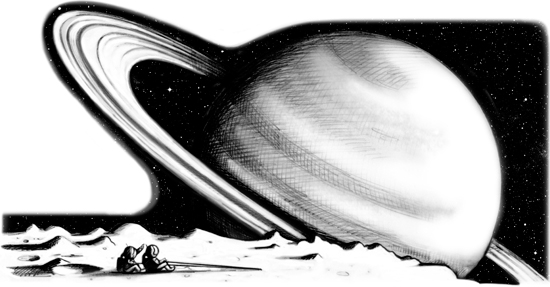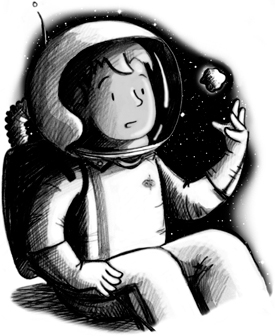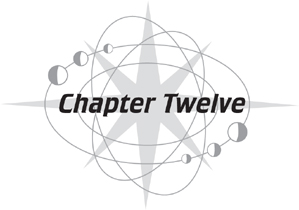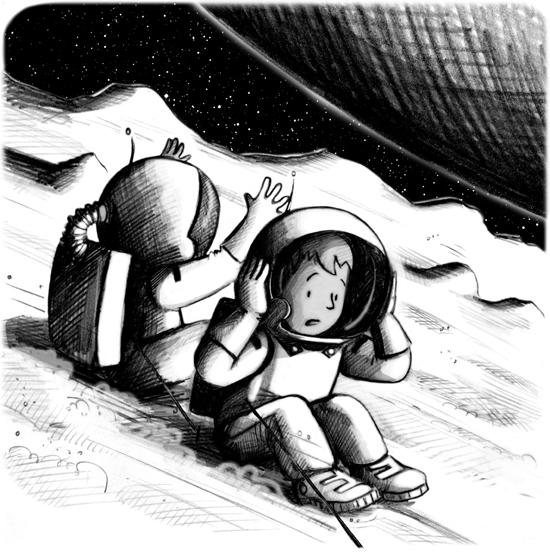When George opened his eyes again, he saw a massive pale yellow planet with a belt of rings rising in the dark sky ahead of them. They sped along on the comet, heading for a point just above the rings. From far away, the rings looked like soft ribbons. Some were pale yellow, like the planet itself; others were darker.
“This is Saturn,” said Annie. “And I saw it first.”
“I know what it is!” replied George. “And what do you mean, ‘first’? I’m in front of you. I saw it first!”
“No, you weren’t looking, you were too scared! You had your eyes shut!” Annie’s voice rang inside his helmet. “Ner-ner-na-ner-ner.”

“No I didn’t!” protested George.
“Shhh!” Annie interrupted him. “Did you know that Saturn is the second biggest of the planets that move around the Sun?”
“Of course I knew,” lied George.
“Oh really?” replied Annie. “Then if you knew that, you’ll know which is the biggest planet of all.”
“Well . . . um . . . ,” said George, who had no idea. “It’s the Earth, isn’t it?”
“Wrong!” trumpeted Annie. “The Earth is teeny-weeny, just like your silly little brain. The Earth is only number five.”
“How do you know that?”
“How do I know you’ve got a silly little brain?” said Annie sarcastically.
“No, stupid,” said George furiously. “How do you know about the planets?”
“Because I’ve done this trip many, many times before,” said Annie, tossing her head as though throwing back her ponytail. “So let me tell you. And listen carefully,” she ordered. “There are eight planets orbiting the Sun. Four are huge and four are small. The huge ones are Jupiter, Saturn, Neptune, and Uranus. But the two biggest are so much bigger than the others that they are called the Giants. Saturn is the second of the giant planets, and the biggest one of all is Jupiter. The four small planets are Mars, Earth, Venus, and Mercury,” she continued, ticking them off on her fingers. “The Earth is the biggest of the small ones, but if you put these four together into a ball, you still wouldn’t get anything nearly as big as Saturn. Saturn is more than forty-five times bigger than these four small planets added together.”
Annie was clearly delighted to be showing off about the planets. Even though he was very annoyed by how smug she was, George was secretly impressed. All he had ever done was dig potatoes and mess around with a pig in his backyard. It wasn’t much in comparison with riding around the Solar System on a comet.
As Annie talked, the comet flew nearer and nearer to Saturn. They got so close that George could see that the rings were made not of ribbons but of ice, rocks, and stones. These were all different sizes, the smallest no bigger than a speck of dust, the largest about twelve feet long. Most of them were moving much too fast for George to catch one. But then he spotted a small chunk of rock calmly floating right next to him. A quick glance behind showed that Annie wasn’t looking. He reached out, snatched up the rock, and held it in his space glove! A real treasure from outer space! His heart was beating fast. The sound was so loud in his ears that he thought Annie must be able to hear it through the sound transmitter in his helmet. He suspected that taking things home from outer space was probably not allowed, so he hoped she hadn’t noticed.
“George, are you all right?” asked Annie. “Why are you wriggling around like that?”
George quickly thought of something to say to divert her attention from the rock he was trying to stuff into his pocket.


